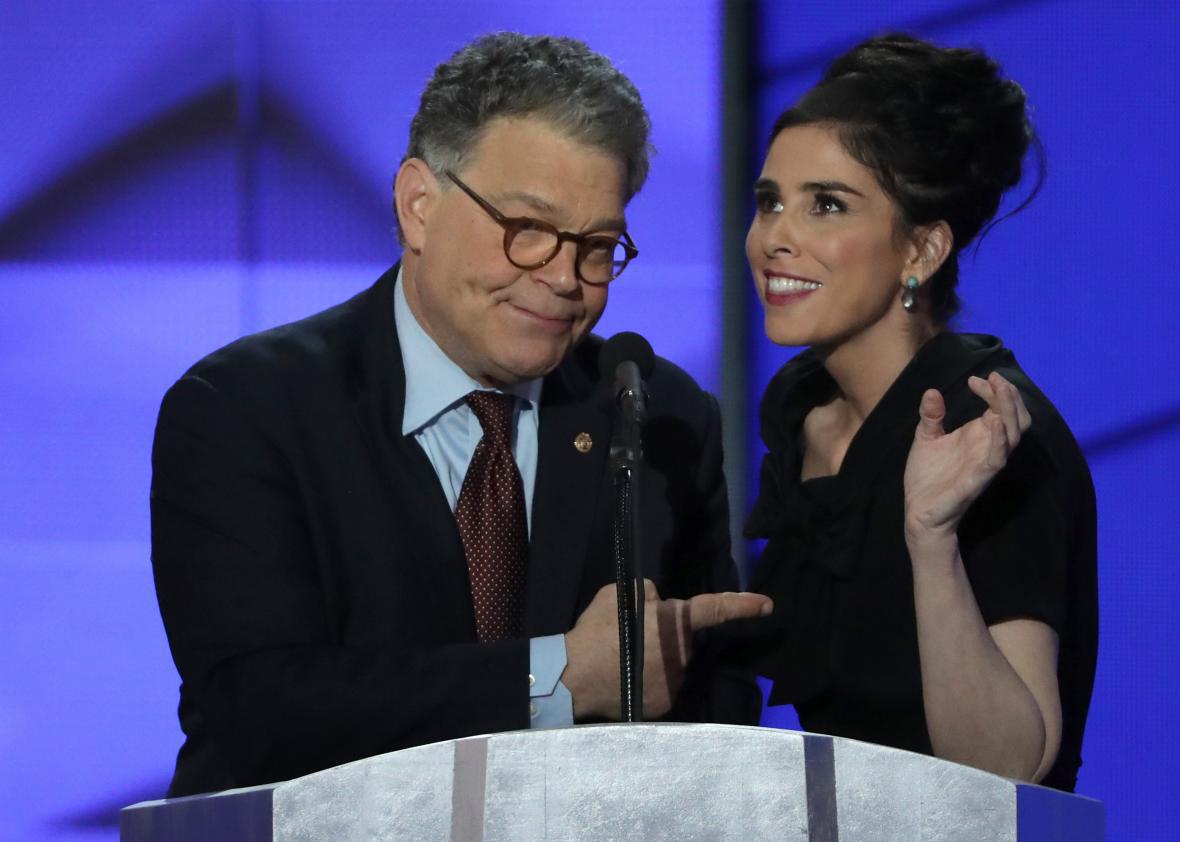Of the many weirdnesses that Donald Trump has wrought on this election cycle, one—of admittedly lesser consequence—has been to make it a safe space for celebrities. For decades, celebrities have been betwixt and between when it comes to politics, the romantic partner politicians let pay for everything but are embarrassed to be seen with in public. As famous and beloved citizens with influence, celebrities have reliably participated in elections, sometimes even appearing on the ballot, but they have just as reliably been castigated for over-stepping and getting political when they should stick to entertaining.
Republicans—who have fielded celebrities for major office (Reagan, Schwarzenegger, Trump) and invited Clint Eastwood to speak to a chair at the RNC—have historically been more likely than Democrats to insult famous people and the politicians who hobnob with them as denizens of an effete liberal Hollywood, out of touch with the values of regular Americans. That they have taken this line because they need to—celebrities do tend to skew Democrat—has not made it any less effective. Democrats, in past elections, have seemed almost sheepish about the star power they could attract, wary of opening themselves up to a line of attack.
This has all gone out the window with Donald Trump, a celebrity who values celebrity. He has staked his campaign on the promise that he is so of the system, that nexus of money and power of which celebrity is a major part, that he can dismantle that system. He promised an RNC awash with stars, famous folk who would be proof of Trump’s own fame. But having suggested that athletes Tom Brady, Serena Williams, Ben Roethlisberger, and Tim Tebow might speak at his convention, Trump had to settle for has-beens Scott Baio and Antonio Sabato Jr. If the conventions are like food fights and celebrities the food, Trump had tossed a few peas at the Democrats, who were manning an all-you-can-eat buffet station.
As last night demonstrated, the most famous people speaking at the DNC are politicians. But free to go on a supermarket sweep for celebrities—if nothing else, the caliber of famous person Hillary can attract to her cause must be driving Donald wild—the Democratic Convention has invited the likes of Katy Perry, Kareem Abdul-Jabbar, America Ferrera, and Lena Dunham to appear, with Demi Lovato, Eva Longoria, and Sarah Silverman all speaking on the first night. And it was Silverman, a stand-up comic, who showed what the right celebrity can do in the right circumstance: handle a crowd.
Silverman was introduced by fellow comedian and Minnesota Sen. Al Franken. Franken said all election season he had been “with her,” while Silverman admitted she had been “feeling the Bern.” “Don’t worry,” she said as the crowd cheered, “I put some cream on it,” the first sign of where her speech was headed. Silverman proceeded to deliver a short, concise, funny speech about how much she loves Bernie and his platform, before endorsing Hillary with “gusto.” She finished her speech with a “booya baba booey,” and then Silverman and Franken were instructed to “stretch”—that is, fill the time until Paul Simon would appear to torture the high notes in “Bridge Over Troubled Water.” Silverman’s endorsement of Hillary had led to some “Hillary” chants, which were soon drowned out by “Bernie” chants, at which point Silverman, clearly irritated but used to dealing with hecklers, said: “Can I just say to the Bernie or Bust people, you’re being ridiculous.”
Silverman’s remarks did not quell the crowd. In the annals of on-stage skewerings, it wasn’t much. Silverman has surely laid into hecklers at her stand-up show much more thoroughly. But her remarks almost immediately made the heckling seem even more juvenile than it had before: She didn’t even have to come up with a better insult. Where a politician would have to ignore the shouts, as Elizabeth Warren did later that night, for fear of making too much of them, or getting besieged by them, Silverman could interact. As a practiced stand-up, she seemed both aggravated and calm. Were the inflexible Bernie supporters really sure they wanted to get further under her skin? Over the noise, undiminished in volume, but somehow abashed, she and Franken tried to banter, Silverman so unbowed she even made a pure Hollywood joke: “Good thing they’ll edit this all out in post.” Celebrities may be out of touch, but, unlike politicians, at least they get to talk back.
